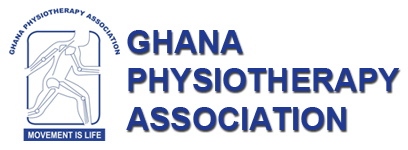THE PHYSIOTHERAPY PROFESSION
Physiotherapy is an allied health profession that involves the use of a holistic approach and physical interventions in the prevention, diagnosis and therapeutic management of pain, disorders of movement or optimization of function to enhance the health and welfare of individuals and communities. Physiotherapists perform tests to assess patients; joint motion (goniometry), strength and endurance of muscles(dynamometry), joint stability(arthrokinematics), walking(gait) pattern, functional ability (physical work capacity); function of the heart and lungs (cardio respiratory fitness), integrity of sensation and perception (sensorimotor status), need and use of braces (orthoses and prosthesis), and performance of activities required in daily living.
The treatment administered by Physiotherapist include the use of therapeutic exercise (to increase strength, endurance, co-ordination and range of joint motion), heat (infra-red radiation, shortwave and microwave diathermies), ultra-violet radiation, ice (cryotherapy), electricity (transcutaneous electrical stimulation), sound (ultrasound), water (hydrotherapy), direct medicine to introduce medicinal ions into the skin and mucous membranes (iontophoresis), manual therapy, electro-acupuncture and cold laser.
Physiotherapists also provide educational services to prevent the incidence of physical disability and movement dysfunction. During treatment, the Physiotherapist monitors the patient’s performance and modifies the treatment plan in the light of the patient’s responses and goals. Apart from these services, Physiotherapists engage in research to develop more effective treatment or methods of evaluation in order to improve patient care. Cognitive scientific knowledge is the flesh of physiotherapy; while psychomotor skills and effective traits constitute the soul of the profession. Researchers from several parts of the world are contributing immensely to the body of physiotherapy knowledge. The major areas of focus in current physiotherapy research include:-
- Neuromuscular re-education
- Musculoskeletal re-education
- Cardiovascular and cardiorespiratory research
- Management of acute and chronic pains
- Kinesiological and Biomechanical studies of Human motion in normal and pathological conditions
- Energy costs in ambulation
- Wound healing, both in chronic and acute stages
Work Settings
- PT’s Provide Care For People In A Variety Of Settings Including;
- Hospitals
- Private Practices
- Outpatient Clinics/Offices
- Health Agencies
- Schools
- Inpatient Rehabilitation Facilities
- Skilled Nursing Homes
- Education Or Research Centres
- Hospices
- Industries Or Other Occupational Environments
- Fitness Centres
- Sports Training Facilities
Job Roles
Physiotherapists are qualified and professionally trained to;
- Undertake a comprehensive examination/assessment of the patient/client or needs of a group of clients.
- Evaluate the findings from the examination/assessment to make clinical judgments regarding patients/clients.
- Formulate a diagnosis, prognosis and plan of treatment.
- Provide consultation within their expertise and determine when patients/clients need to be referred to another healthcare professional.
- Implement a physiotherapy intervention/treatment programme.
- Determine the outcomes of any interventions/treatments.
- Make recommendations for self-management
